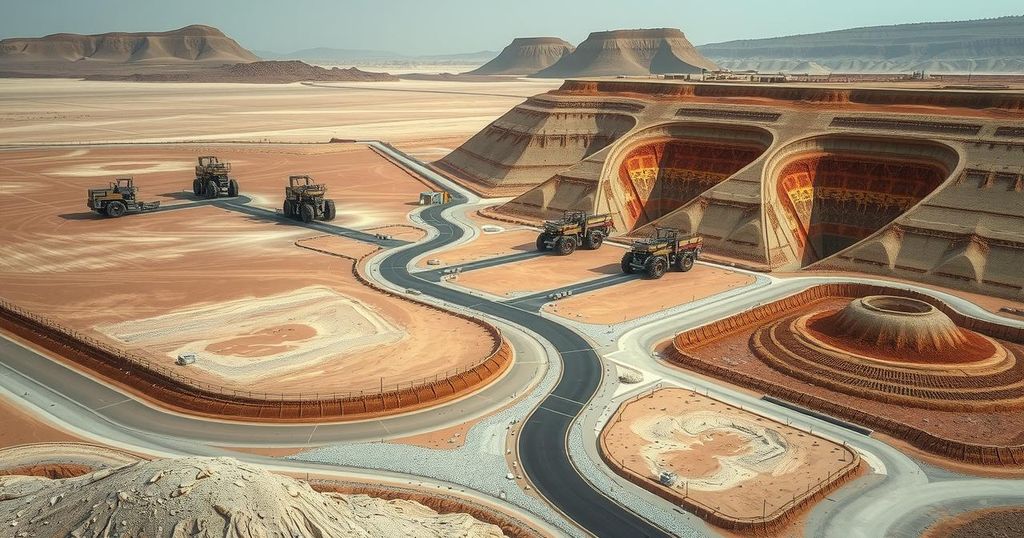Lithium Mining in Zimbabwe Threatens Water and Grazing Rights of Local Communities
Lithium mining in Zimbabwe is drastically affecting local communities’ grazing and water rights. The increased demand for lithium for batteries is complicated by governmental land expropriations favoring foreign companies. Indigenous groups have been denied adequate compensation, and there are significant environmental concerns regarding water contamination. Without clear protections and regulations in place, communities are left at the mercy of mining interests, jeopardizing their livelihoods.
The surging demand for lithium, necessary for electric car batteries and household solar technology, is creating significant challenges in Zimbabwe. Notably, several lithium mines are located in communal areas such as the Mandihongola mine in Gwanda, the Sandawana lithium mine in Mberengwa district, and the Arcadia lithium mine in Goromonzi district. The situation is complicated by a provision in Zimbabwe’s Mines and Minerals Act that allows the president to expropriate land for mining, despite concerns over rights previously assigned to Chinese companies.
Communities living in proximity to mines, some with deep-rooted histories stretching back generations, are now facing severe threats to their grazing lands and water resources due to mining operations. For instance, in Gwanda district, lithium mining overlaps with settlements like Garanyemba, putting both livelihood and future at risk. Residents increasingly find themselves with little to no compensation for the mining encroachments on their grazing land.
Adding another layer to this dilemma, international human rights law intersects with land rights issues. Yet, the explicit right to land remains a grey area in these laws. Rural district councils possess authority over land management, potentially superseding local landowners’ rights. However, there is uncertainty regarding how effectively these councils will protect indigenous rights as mining interests continue to grow.
The Zimbabwean government has been vague about the environmental impacts of lithium mining, and communities assert they have not reaped any substantial benefits from these operations. Instead, most workers are trapped in labor roles with minimal wages that hardly sustain their families. It is critical that authorities prioritize the protection of grazing and water rights as the balance between mining interests and indigenous inhabitants’ rights hangs in the balance.
Communities, particularly in Mandihongola, are voicing their concerns regarding the operations of the Chinese company extracting approximately 1000 tonnes of lithium daily. This mining threatens already scarce water sources and leads to contamination of water supplies—essential for livestock and agricultural practices. Ranching is a key wealth source for locals, and without careful management, their situation could deteriorate.
A notable absence of responses from the Environmental Management Agency raises alarm bells. There are no clear indications that inspections or protective measures for grazing and water rights have taken place. Similarly, the silence from the Ministry of Environment, Climate, and Tourism adds to the frustration felt by affected communities.
As the nation grapples with severe land degradation and pollution—from mercury and cyanide linked to both artisanal and industrial mining—the stakes are higher than ever. Legislative measures targeting environmental violations exist, such as hefty fines under the Environmental Management Act for polluting water sources. Nonetheless, rural communities often lack the means to challenge mining operations that jeopardize their livelihoods.
There is a pressing need for comprehensive plans addressing the rehabilitation of lithium mining sites. It is unacceptable to overlook the mining impacts on communal lands when residents’ rights and livelihoods hang in the balance. We must pay attention and take action before its too late.
Dr. Hoitsimolimo Mutlokwa, a postdoctoral researcher at the Centre for Labour Law in the Faculty of Law at the University of the Free State, highlights the urgency of this matter.
In conclusion, Zimbabwe’s lithium mining boom presents numerous threats to local communities, particularly regarding their land, water, and grazing rights. As government oversight appears to wane, the need for effective advocacy and protections for indigenous rights becomes increasingly urgent. Without meaningful intervention and dialogue, the long-term consequences for these communities could be devastating.
Original Source: www.newzimbabwe.com




Post Comment